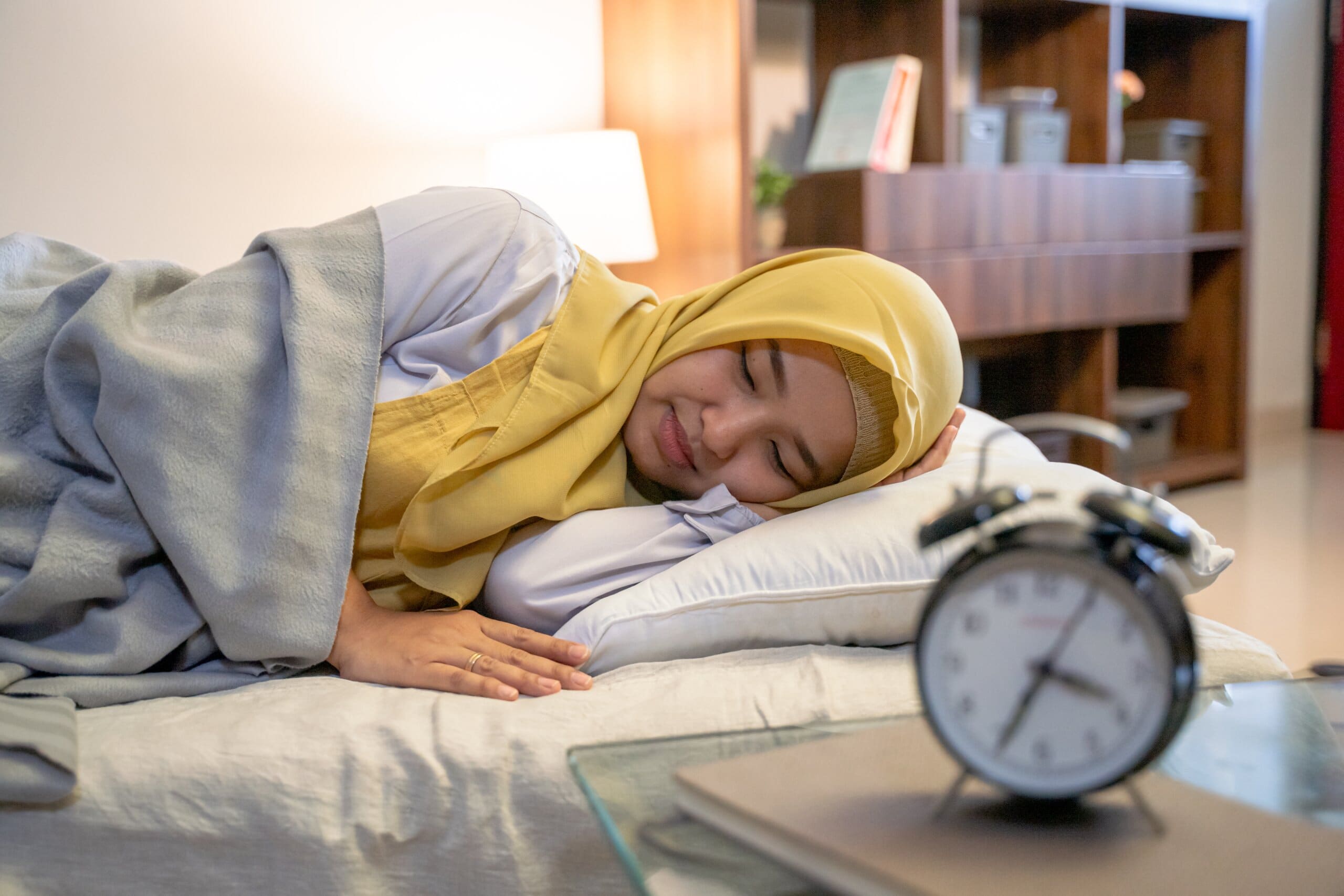Around the world, an estimated two billion Muslims observe Ramadan every year. It’s an important month-long celebration to commemorate Muhammad’s first revelation, where people celebrate their faith, family, and friends – but changing your daily habits for four weeks can make it hard to stick to a routine.
You might experience sleep deprivation during Ramadan, which is perfectly normal, but what’s the best way to deal with it? We’ll be answering common questions about getting enough sleep during the holy month, including whether you can sleep during the day in Ramadan, and how long you should wait after iftar before sleeping. Read on to find out all you need to know to sort your Ramadan sleep schedule!

What is Ramadan?
Ramadan is the ninth month of the Islamic calendar and is marked by a period of fasting. All healthy Muslim adults are required to avoid eating and drinking during the day, instead having a meal before dawn known as suhur, and a feast after sundown called iftar.
To commemorate the holy month, Muslims are encouraged to read the Quran and partake in nightly prayers. They also avoid sexual relations, tobacco, and any sinning over this period. The end of Ramadan is marked by Eid-al-Fitr – one of the most important celebrations in Islam.
How can Ramadan affect your sleep schedule?
You’ve probably heard of your circadian rhythm – the internal body clock that keeps track of when to sleep and wake up. Sticking to a regular sleep schedule is essential in controlling this process and making sure your body is getting the rest it needs when necessary, but other factors can affect your circadian rhythm too.
Studies have shown that diet plays a factor in controlling your sleep, with regular meal timings allowing for better rest. Furthermore, eating late at night sends hormones to your brain that can keep you awake. Since Ramadan changes your dietary requirements for a month and delays your meals, it’s natural to start feeling tired during the daytime, especially since our bodies rely on food to combat fatigue.
What are the effects of losing sleep during Ramadan?
When we lose sleep, our brains can’t function as effectively, and our bodies aren’t able to keep up with their usual routines as effectively. You may notice yourself getting drowsy during the day while observing Ramadan or struggling to focus on important tasks like work or school.
Surveys have shown that daytime sleepiness takes a sharp rise during the first week of Ramadan, and that the number of observers in regular exercise routines drops by the end of fasting.
If you’re sleep deprived, you can struggle to hit all the necessary cycles of sleep that make rest so important, so it’s crucial to stay on top of your bedtime routine and avoid interruptions to your rest.

How to keep your sleep regular during Ramadan
If you’re experiencing sleep deprivation during Ramadan, it’s likely that your circadian rhythm has been affected. Getting your body clock back on the right track can take some time, but there are plenty of ways to adjust your habits to improve the timings of your sleep. Here are a few ways you can reset your circadian rhythm during Ramadan:
Cut down on screen time
While it can be tempting to check your phone before bed, your screen time can fool your body into changing its body clock. Screens on devices like phones and computers emit blue light, which the brain struggles to differentiate from sunlight. This means that our brains naturally become more awake when browsing social media or texting our friends, affecting how easily we can sleep.
Before sleeping during Ramadan, make sure you give yourself a grace period without screen time so that you can get to sleep at an appropriate time. Consider swapping your scrolling for more relaxing activities, such as light reading.
Avoid exercise before bed
Exercise produces hormones like endorphins and adrenaline, which excite the brain and make it more alert. While you might expect pre-bedtime exercise to tire you out and prepare you for sleep, the opposite is true, and you’ll struggle to drift off following the high of physical activity.
If you’re sticking to an exercise regimen, make sure you leave enough time between your daily routine and your bedtime.
Stay hydrated and avoid caffeine
One of the most essential parts of sleep is the cycle known as “deep sleep”, which usually occurs an hour after first getting to sleep. This period of sleep helps your body grow and repair tissue, strengthens your immune system, restores your energy, and more. If you’re not getting enough deep sleep, there are a number of knock-on effects that can cause fatigue the next day.
To avoid interruptions when trying to get deep sleep, it’s advised to avoid stimulants like caffeine that may affect your brain’s activity during this phase. It’s also important to drink enough water throughout the day to keep your body healthy. Hydrating can be tough when fasting, so make sure you restore your levels an appropriate amount at your daily meals.

How long should you wait to sleep after eating?
With evening meals during Ramadan taking so much preparation, and the time constraints of waiting for sundown, many Muslims have to wait a long time for their first large meal of the day. If this is too close to their typical bedtime, then sleeping can become much harder.
Usually, it’s recommended to wait two or three hours after eating before trying to sleep, as the digestion process will distract the body from getting rest at night. Some scientists argue that this period should be longer, and could even last up to five hours, but 120-180 minutes are mostly agreed upon as an appropriate amount of time between eating and resting.
Can you sleep during the day in Ramadan?
Sleep is an important concept in Islamic scripture, and multiple hadiths encourage healthy sleep practices. In the Sahih Bukhari, the Prophet Muhammad encourages anyone who feels drowsy while praying to immediately get rest, so that they can understand the meaning of their prayer once they are awake.
The concept of “qailulah” is also touted in Islam. This is a midday period of rest that involves sleeping or lounging to regain energy. Midday periods of rest may be hard to fit in your routine if you’re in work or school, but don’t be afraid to get some extra shut-eye if the knock-on effects of fasting are getting to you.
If a lack of sleep is affecting you during Ramadan, be sure to tell others about your issues in case they’re able to help or make any adjustments to your schedule. It’s better to share your problems than bottling them up!
Still struggling to sleep after following all of our steps? Maybe it’s time to upgrade to a better quality night’s sleep. At MattressNextDay, we offer a variety of mattresses with flexible delivery options to help you fix your sleep as soon as possible. With a range of materials, sizes, and firmness ratings, there’s a mattress to suit everyone’s needs. Browse our collection today and start investing in your sleep!




